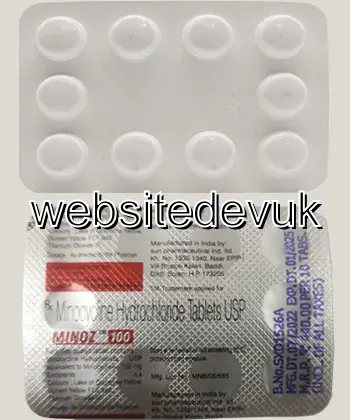| Package | Dosage | Price | Price per Dose | |
|---|---|---|---|---|
| Dosage: 50mg | ||||
| 45 pill | 50mg | £144.58 | £3.21 | |
| 30 pill | 50mg | £103.55 | £3.45 | |
| 15 pill | 50mg | £64.47 | £4.32 | |
| Dosage: 100mg | ||||
| 120 pill | 100mg | £329.22 | £2.75 | |
| 90 pill | 100mg | £256.93 | £2.85 | |
| 60 pill | 100mg | £189.52 | £3.17 | |
| 30 pill | 100mg | £106.48 | £3.55 | |

Minocycline Hydrochloride Description
Overview of Minocycline Hydrochloride
Minocycline Hydrochloride is a broad-spectrum antibiotic that belongs to the tetracycline class of medications. It is commonly used to treat various bacterial infections due to its ability to inhibit bacterial protein synthesis. This medication is available in different forms, including capsules, tablets, and topical formulations, making it versatile for treating different types of infections. Minocycline is especially known for its effectiveness against acne vulgaris, skin infections, urinary tract infections, and certain respiratory infections.
Mechanism of Action
The primary way Minocycline Hydrochloride works is by binding to the bacterial 30S ribosomal subunit. This action prevents the bacteria from synthesizing essential proteins needed for growth and reproduction. As a result, it effectively controls bacterial proliferation. Because these processes are vital for bacterial survival, the medication can quickly reduce the bacterial load in infected tissues. Its ability to penetrate tissues well makes it particularly effective for skin and soft tissue infections.
Benefits of Minocycline Hydrochloride
One of the main benefits of Minocycline Hydrochloride is its high efficacy in treating acne. It helps reduce inflammation and bacterial colonization on the skin, leading to clearer skin over time. Additionally, it is appreciated for its relatively long half-life, allowing for less frequent dosing. Patients often find it convenient to take, which can improve adherence to treatment plans. The medication's broad-spectrum activity also makes it suitable for tackling various other bacterial infections, which is why it is commonly prescribed by healthcare providers.
Potential Side Effects and Precautions
Like all antibiotics, Minocycline Hydrochloride can cause side effects. Common adverse reactions include nausea, dizziness, and gastrointestinal discomfort. Some patients may experience skin hypersensitivity reactions or increased sun sensitivity, leading to easy sunburn. In rare cases, Minocycline has been linked to more serious issues such as dizziness, dizziness, and autoimmune reactions. It is important to inform your healthcare provider if you experience unusual symptoms or allergic reactions during treatment.
Patients with a history of allergies to tetracyclines should avoid Minocycline. It is also not recommended for use in pregnant women or young children due to the risk of teeth discoloration and interference with bone development. Caution is advised when taking this medication alongside other drugs, particularly those affecting the liver or blood. Regular monitoring and following the prescribed dosage are crucial to minimize risks and ensure treatment effectiveness.
Usage and Dosage Recommendations
The exact dosage of Minocycline Hydrochloride depends on the type and severity of infection, as well as patient-specific factors. Typically, for adult acne, the dosage might be around 50-100 mg twice daily. For other bacterial infections, healthcare providers tailor the dose accordingly. It is essential to complete the full course of treatment, even if symptoms improve early, to prevent resistance development. Taking the medication with a full glass of water and avoiding lying down immediately afterward can help prevent irritation in the esophagus.
Patients are advised to stay attentive to any side effects during therapy. If adverse reactions occur or if there is no improvement within a few days, consulting your healthcare provider is recommended. Regular follow-up assessments ensure that the medication is working effectively and safely.